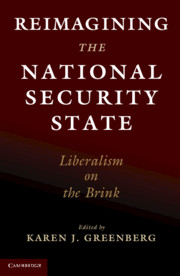Part III - The Future Imagined
-
- Book:
- Reimagining the National Security State
- Published online:
- 25 October 2019
- Print publication:
- 07 November 2019, pp 139-186
-
- Chapter
- Export citation
10 - Reestablishing the Rule of Law as National Security
- from Part III - The Future Imagined
-
-
- Book:
- Reimagining the National Security State
- Published online:
- 25 October 2019
- Print publication:
- 07 November 2019, pp 154-168
-
- Chapter
- Export citation

Reimagining the National Security State
- Liberalism on the Brink
-
- Published online:
- 25 October 2019
- Print publication:
- 07 November 2019


